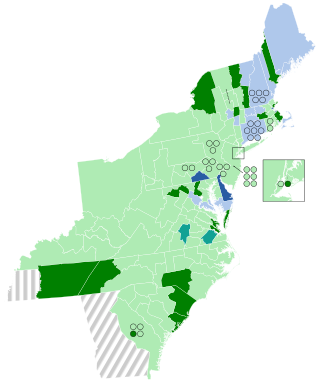The 1818–19 United States House of Representatives elections were held on various dates in various states between April 26, 1818 and August 12, 1819. Each state set its own date for its elections to the House of Representatives before the first session of the 16th United States Congress convened on December 6, 1819. They occurred during President James Monroe's first term. Also, newly admitted Alabama elected its first representatives in September 1819, increasing the size of the House to 186 seats.
The 1816–17 United States House of Representatives elections were held on various dates in various states between April 30, 1816 and August 14, 1817. Each state set its own date for its elections to the House of Representatives before the first session of the 15th United States Congress convened on December 1, 1817. The size of the House increased to 184 after Indiana and Mississippi achieved statehood.

The 1808–09 United States House of Representatives elections were held on various dates in various states between April 26, 1808, and May 5, 1809. Each state set its own date for its elections to the House of Representatives before the first session of the 11th United States Congress convened on May 22, 1809. They coincided with James Madison being elected as president. Elections were held for all 142 seats, representing 17 states.

The 1806–07 United States House of Representatives elections were held on various dates in various states between April 29, 1806 and August 4, 1807. Each state set its own date for its elections to the House of Representatives before the first session of the 10th United States Congress convened on October 26, 1807. They occurred during Thomas Jefferson's second term. Elections were held for all 142 seats, representing 17 states.

The 1804–05 United States House of Representatives elections were held on various dates in various states between April 24, 1804 and August 5, 1805. Each state set its own date for its elections to the House of Representatives before the first session of the 9th United States Congress convened on December 2, 1805. The elections occurred at the same time as President Thomas Jefferson's re-election. Elections were held for all 142 seats, representing 17 states.
Edmund Wilcox Hubard was a nineteenth-century American politician, appraiser and justice of the peace from Virginia.

The 1806–07 United States Senate elections were held on various dates in various states. As these U.S. Senate elections were prior to the ratification of the Seventeenth Amendment in 1913, senators were chosen by state legislatures. Senators were elected over a wide range of time throughout 1806 and 1807, and a seat may have been filled months late or remained vacant due to legislative deadlock. In these elections, terms were up for the senators in Class 3.

The 1808 United States House of Representatives elections in New York were held from April 26 to 28, 1808, to elect 17 U.S. Representatives to represent the State of New York in the United States House of Representatives of the 11th United States Congress. At the same time, a vacancy was filled in the 10th United States Congress.

North Carolina elected its members August 14, 1817.

Elections to the United States House of Representatives were held in North Carolina on August 10, 1804 for the 9th Congress.
A special election was held in North Carolina's 7th congressional district on February 1, 1808. In the 1806 elections, John Culpepper (F) had defeated incumbent Duncan McFarlan (DR), but McFarlan contested the election, and, on January 2, 1808, the House Committee on Elections declared the seat vacant.
A special election was held in South Carolina's 6th congressional district June 1–2, 1807 to fill a vacancy left by the death of Levi Casey (DR) on February 3, 1807.

South Carolina elected its members October 13–14, 1806.

Maryland elected its members October 6, 1806.

On January 1, 1818, a special election was held in North Carolina's 7th district to fill a vacancy left by the death of Representative-elect Alexander McMillan (F) before the 15th Congress had assembled.

The 1806 United States House of Representatives election in Delaware was held on October 7, 1806, to elect the U.S. representative from Delaware's at-large congressional district. Incumbent Federalist James M. Broom faced re-election to a full term after winning the previous year's special election. He was challenged by three Democratic-Republicans.

North Carolina elected its members August 13, 1829 after the term began but before Congress convened.

This is a list of elections in the U.S. state of North Carolina.

The 2018 United States House of Representatives elections in North Carolina were held on November 6, 2018, electing the thirteen U.S. representatives from the State of North Carolina, one from each of the state's congressional districts. The elections coincided with other elections to the House of Representatives, as well as elections to the United States Senate and various state and local elections.

The 1876 United States presidential election in North Carolina took place on November 7, 1876, as part of the 1876 United States presidential election. North Carolina voters chose 10 representatives, or electors, to the Electoral College, who voted for the president and vice president.









